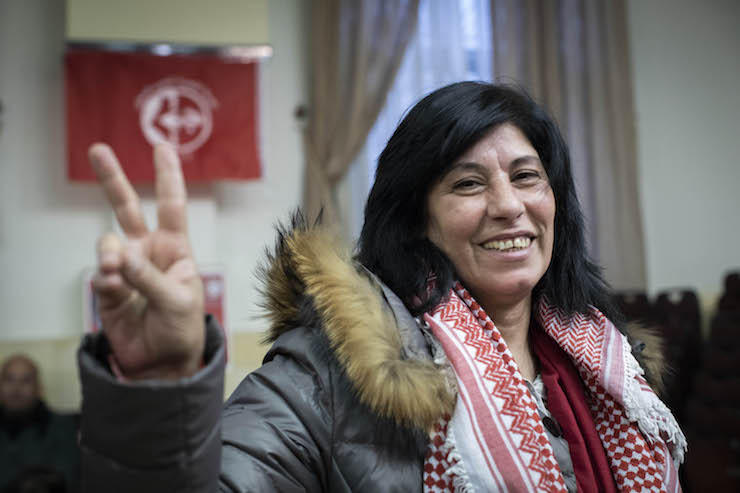Khalida Jarrar is released from Israeli custody following almost two years under administrative detention.

Palestinian lawmaker Khalida Jarrar seen following her release from 20 months of administrative detention, Ramallah, West Bank, February 28, 2018. (Oren Ziv/Activestills.org)
Palestinian parliament member Khalida Jarrar was released Thursday morning after nearly two years in Israeli administrative detention. This is not the first time Israel has put Jarrar under administrative detention, a practice in which detainees are held without charge or trial.
Jarrar was first arrested in April 2015 and placed under administrative detention for six months, after she refused to comply with a military expulsion order. The Israeli army had ordered her at the time to leave her home in Ramallah within 24 hours and move to Jericho for a period of 1.5 years. Israeli military authorities accused her of being a member of the Popular Front for the Liberation of Palestine, a party she represents in the Palestinian Legislative Council, but which is outlawed by Israel.
“I still do not know what I was arrested for, I was only told that I am dangerous,” Jarrar said during a reception in Ramallah on Thursday afternoon. “This is what we have always said when it comes to administrative detention — that it’s arbitrary. That it’s always political. Therefore we demand to put an end to this illegal practice.”
Jarrar’s detention led to a global campaign for her release. She was eventually released from administrative detention and put on trial, where she faced 12 charges, the majority of which involved her parliamentary work and activism: her association with the PFLP, participation in protests, giving speeches and interviews to the media, a visit to a solidarity tent for Palestinian prisoners, and incitement to kidnap Israeli soldiers. In December 2015, Jarrar was sentenced to 15 months in prison as part of a plea bargain.
She was released in June 2016, only to be re-arrested a year later, in July 2017. She had been in administrative detention ever since.
“I met prisoners from all over Palestine, from ’48, from Jerusalem to the West Bank and Gaza,” she told journalists during the reception. “Women prisoners and minors. Their message is one: they want freedom. The second demand is a call for Palestinian unity.”
“I feel mixed feelings. I left behind 48 women prisoners who suffer and want freedom, “Jarrar continued. “On the other hand, I’m very happy to be released because there is nothing like being free. It gives me the strength to continue fighting for imprisoned women.”
According to Jarrar’s attorney, Mahmoud Hassan, her family had been told ahead of time that the administrative order would not be renewed unless significant new information was received. Jarrar was originally supposed to be released on Thursday afternoon, but Israeli authorities decided to let her go in the early hours of the morning on Thursday, most likely in order not to draw the attention of the media.
Administrative orders can be renewed indefinitely for up to six months at a time, and can be used to extend the jail time of someone who has finished serving their sentence. The orders are reviewed every six months, but the detainees are not always told of what crimes they are being accused or shown the evidence against them. The result is that it is virtually impossible to defend oneself.
Under international law, administrative detention should only be used in the most extreme cases. In most modern legal systems, police or prosecutors release suspects when they don’t have enough evidence to charge them with a crime. In Israel, especially when the suspect is Palestinian, prosecutors and security forces often find other ways to keep them behind bars.
WATCH: Administrative detention explained
Several years ago, at the height of mass hunger strikes by Palestinian prisoners, a senior Israeli security official confirmed that the state uses administrative detention in many cases out of laziness and when it just hadn’t bothered to collect enough evidence.
Then-public security minister Yitzhak Aharonovich recommended to security officials at the time that administrative detention be used “only if there is a need and not in all cases,” an implicit admission that the practice was being applied in far more cases than the exceptional, extreme circumstances in which international law permits its use. In a number of high profile cases over the years, Israel has implicitly exposed once again that it is using administrative detention as a first, and not last resort.
According to Palestinian prisoner rights group Addameer, at the end of December 2018, Israel was holding 480 Palestinians, including eight members of the Palestinian Legislative Council, in administrative detention.





